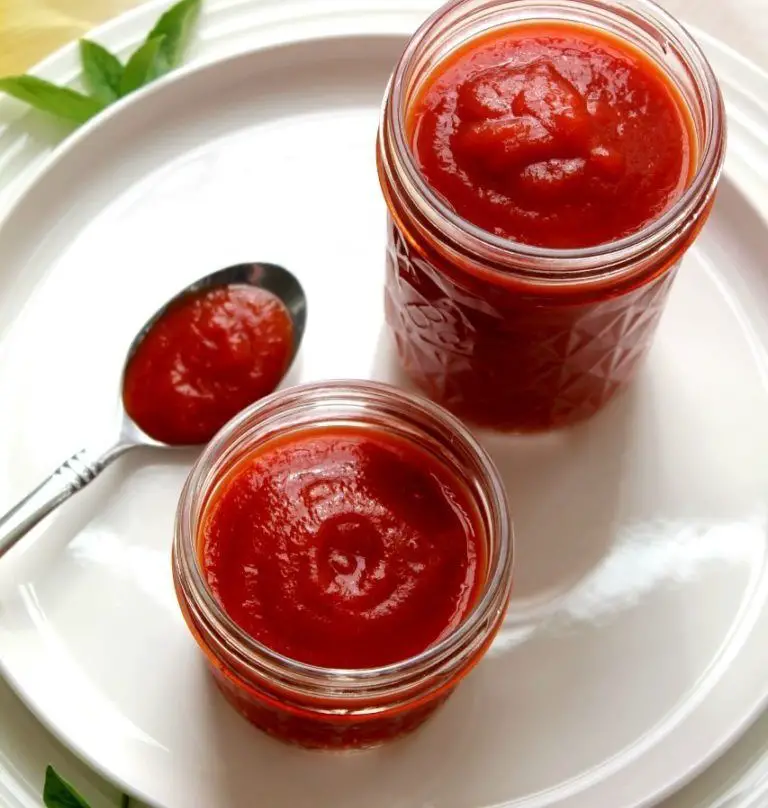Whether it’s french fries, burgers, hash browns, or a plain omelet, ketchup may enhance the flavor of any dish.
Some consider this popular and inexpensive red condiment to be healthful, but that does not mean you may consume huge amounts of it.
Ketchup is a condiment produced from low-calorie ingredients such as spices, salt, pepper, vinegar, and tomatoes.

In comparison to other famous competitors such as mayonnaise, ketchup has no fat and fewer calories.
However, the sugar and salt level of ketchup is a worry for some individuals. Furthermore, it typically contains undesirable natural flavoring, tomato concentrate, and, most crucially, high fructose corn syrup.
Therefore, the key is not to avoid ketchup entirely but to minimize its intake.
Contents
Nutritional Information
As a tomato-based condiment, ketchup has a straightforward nutritional profile. In addition, since you often use only a small amount of ketchup with your meal, you won’t receive any necessary nutrients from it.
There are 17 grams of ketchup in 1 tablespoon.
- Calories: 17
- Carbs: 4.5 grams
- Protein content: less than 1 gram
- fiber content: less than 1 gram
- less than 1 gram of fat
- 7% of the Daily Value for Sugar (DV)
- Sodium: 7% of the Daily Value
In comparison to other condiments, 1 tablespoon of ketchup contains about twice as many calories as mustard and less than a quarter as many as mayonnaise.
In terms of sugar, ketchup often contains more than mayonnaise or mustard, both of which have less than 1% of the daily value per 1-tablespoon (17-gram) portion, compared to ketchup’s 7%.
Is It Fattening?
Tomato ketchup includes a significant level of sugar and preservatives, both of which may increase body fat when consumed in excess. Additionally, it may decrease the amount of insulin in the body.
Possible Health Advantages
Consuming relatively small amounts of condiments like ketchup is unlikely to have a significant effect on your health.
Tomatoes are beneficial to eat since they contain lycopene and other chemicals with antioxidant potential. However, you are unlikely to consume enough ketchup to reap these benefits.
There are a few publications that tout the health benefits of ketchup. Examining the claims and the science underlying them can be beneficial. The following are some of the benefits.
Reduced Risk for Other Conditions
In a published summary of the health benefits of lycopene, researchers explain that when raw tomatoes are heated to make tomato juice, tomato paste, or ketchup, the natural lycopene changes into a form that is easier for the body to absorb.

The study’s authors talk about how lycopene has a lot of antioxidant properties and say that it might help prevent heart disease and cancers of the prostate, breast, lung, bladder, ovaries, colon, and pancreas.
Reduced Prostate Cancer Risk
A 2010 study investigated the association between tomato-based food products and prostate cancer risk. Researchers hypothesized that tomato-based products include anticancer phytochemicals that can influence men’s cancer risk levels.
They also said that special tomato-based foods, which are often called “functional foods,” could be made to target prostate cancer.
However, ketchup is not covered in the report, except for the fact that ketchup and tomato juice account for approximately 15% of the total consumption of tomato-based products in the United States.
The researchers did not find any correlation between ketchup consumption and prostate cancer risk.
May Reduce LDL Cholesterol
High levels of low-density lipoprotein (LDL), which is usually called “bad” cholesterol, can make it more likely that you will get heart disease. A separate study discovered that tomato juice can reduce LDL cholesterol levels.
This study showed that adding tomato ketchup to a diet can have a positive effect on both “good” LDL and “good” HDL cholesterol levels.
More research needs to be done to find out how ketchup affects cholesterol levels.
Reduced Cardiovascular Disease Risk
Tomatoes’ lycopene content is related to a reduced risk of heart disease. One study showed that taking lycopene supplements can improve endothelial function in people with heart disease but not in healthy people.

But these researchers didn’t look at the effects of tomatoes or diets high in tomatoes; they only looked at lycopene. So, it’s not clear whether or not people who usually eat a lot of ketchup will get this benefit.
Adverse Effects
When consumed in moderation, ketchup is absolutely safe for the vast majority of people. The condiment can be simply incorporated into a healthy diet.
However, excessive consumption of ketchup may induce moderate negative effects.
The possible disadvantages of ketchup are:
Some Individuals May Be Allergic
It is conceivable, albeit uncommon, to have an allergy or sensitivity to ketchup. A ketchup allergy may be triggered by tomatoes or other condiment ingredients, such as vinegar containing sulfites, salicylates, and gluten.
High In Sugar
A spoonful of ketchup may contain 7% or more of your daily sugar allowance. If you consume 4–5 tablespoons of ketchup with a single meal, you may consume 35% or more of the daily value of sugar from the ketchup alone.

Acidic Food Item
Tomatoes are a very acidic food, and so is ketchup, which is made from concentrated tomatoes. If you have heartburn or acid reflux, eating too much ketchup can make these problems worse.
Contains A Lot Of Salt
The majority of bottled ketchup products are likewise rich in sodium. If you are sensitive to salt, consuming an excessive amount of salt can contribute to high blood pressure, heart disease, and other health issues.
Conclusion
Ketchup is a classic condiment that pairs well with sandwiches, burgers, French fries, and other foods.
If you prefer ketchup, you may be pleased to learn that it is a good source of lycopene because it is made from tomatoes.
Increasing your lycopene intake may protect you from cancer, heart disease, and other chronic diseases.
However, certain varieties of ketchup are heavy in sugar and salt. In addition, some of the substances in ketchup may irritate your stomach if you suffer from acid reflux, gluten-related problems, or tomato allergies.
Try not to eat more than a few tablespoons of ketchup at a time to get the most health benefits from it. Combine ketchup with other healthy dishes and choose versions of ketchup with less sugar and salt.

